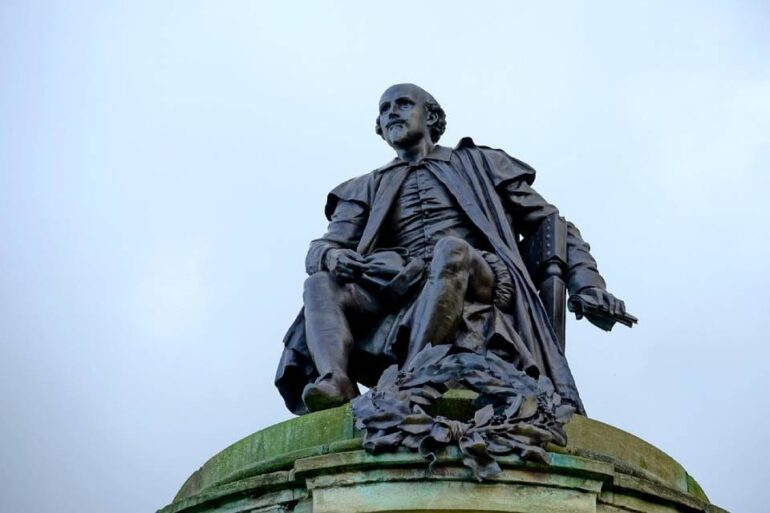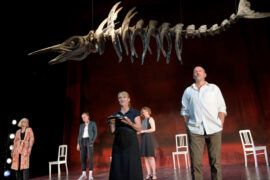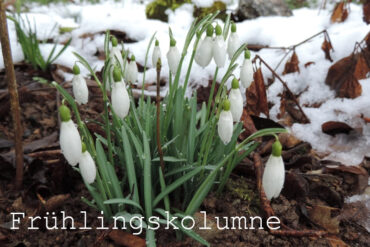Paul Stebbings’ production of Much Ado About Nothing was performed in Bückeburg on September 16 despite challenging indoor conditions caused by heavy rain. Despite poor acoustics, loud music, and limited organisation, the cast delivers a lively, engaging performance. Bethany Barnes as Beatrice is a particular highlight, bringing sharp wit and charisma that carries the play and keeps the audience laughing.
By Sara Mirjavadi
Much Ado About Nothing is one of Shakespeare’s most beloved comedies, a play that thrives on sharp exchanges, clever deception, and a slow-burning romance. The story follows two intertwining love plots. The playful »merry« war of words between Beatrice and Benedick, who are tricked into confessing their feelings for each other, and the more serious tale of Hero and Claudio, whose romance nearly ends in tragedy due to malicious and outrageous lies, before harmony is finally restored.
This production, directed by Paul Stebbings and featuring music by Paul Flush, is produced by Grantly Marshall. It takes a lively and modern approach to the text. Dan Wilder plays Benedick and Bethany Barnes takes on the role of Beatrice; their verbal sparring is at the beating heart of the play. They are joined by Glynn Cannop, Hannah Harquat, Justin Skelton, and Tom Dean, who together form a well-rounded ensemble. A charming surprise is the inclusion of Bard the Cat, a stuffed doll that delights the audience with its appearance and adds an unexpectedly sweet note to the performance.
Curtain Rises
The journey from Göttingen to Bückeburg is smooth, with only minor delays due to Deutsche Bahn, setting the tone for an evening of theatre. However, heavy rain forces the production indoors, transforming what could have been a light open-air Shakespeare evening into a warm, humid hall performance. Anyone who has seen pictures of the beautiful Schloss Bückeburg, or visited it in person, can imagine the high expectations such a setting would create: Shakespeare beneath the open sky, framed by a castle and its grounds. Of course, the weather is beyond the control of the production team, yet moving indoors inevitably dims the mood and alters the atmosphere. What I encountered, however, was quite different.
With no cloakroom available, wet jackets remain on, filling the venue with the smell of damp fabric, which is slightly dulling the festive atmosphere of this comedy. Nevertheless, the audience is diverse and lively, with many school groups in attendance as part of their English programmes. Their excitement fills the space with energy and anticipation before the lights dim.
Though the event organisation feels rushed. Ticket checks are casual, and there is no working scanner for barcodes during busy periods. There is no free program sheet available; only a five-euro booklet for purchase. While the booklet is informative, the lack of a complimentary sheet is disappointing and slightly detracts from the occasion.The set is minimalist, consisting of three faux-marble pieces forming the core of the staging and used resourcefully by the actors to create depth and dynamism. There are no elaborate scene changes or backdrops, keeping the focus firmly on the performance.
Actors wait visibly in the wings, ready for their entrances. Rather than being a distraction, this detail lends the performance an intimate feel and reminds the audience of theatre’s collaborative, live nature. Unfortunately, the indoor venue creates significant acoustic problems. The hall’s echo makes Shakespeare’s language harder to follow and blurs comic timing. Music is at times too loud, drowning out dialogue. For a play that relies so heavily on verbal wit, this is a major obstacle. Despite the cast’s efforts to project, they are fighting against the space throughout.
This becomes especially clear in the scenes featuring Don John’s scheming, when his words can barely be heard even from close to the stage. Without the visual comedy of him villainously petting his cat, the moment falls flat. A similar issue arises during the famous trick scenes, when first Benedick and then Beatrice are both led to believe that the other is in love. Here, the audience responds more to the performers’ lively physicality rather than to the sharpness of the dialogue, much of which is lost to the poor acoustics.
Where Performance Brings the Play to Life
The performances redeem the evening. Bethany Barne’ performance as Beatrice is a standout: her voice is clear, her comic timing precise, and her physicality inventive. The famous Act 3, Scene 1 »overhearing« sequence, where Beatrice is tricked into believing that Benedick secretly loves her, is a particular highlight, full of clever use of the stage and audience laughter. Act 5, Scene 1, in which Don John’s deception is finally uncovered and the truth about Hero’s supposed infidelity comes to light, is another peak moment. Here the cast’s comic energy is at its highest, earning the warmest laughter of the evening and bringing the audience fully into the story. At around ninety minutes long without an interval, the production maintains its momentum and keeps its predominantly school-aged audience engaged. Laughter is frequent, especially in scenes involving Beatrice, Benedick, and Dogberry, which confirms that Shakespeare’s humour still resonates despite technical hurdles.
Final Impressions
This production of Much Ado About Nothing is spirited but hampered by its venue. Although the echo, loud music, and lack of facilities spoil the experience, the ensemble’s commitment, inventive staging and moments of genuine comic energy ensure that the heart of the play is felt. As the audience leaves, laughter can be heard, which is perhaps the best measure of success for a Shakespearean comedy. And what could be a more fitting finale than the final wedding celebrations, crowned by Benedick and Beatrice’s long-awaited, comical declaration of love? A true Shakespearean happily »ever after«.
Although the Much Ado About Nothing tour has now ended, the American Drama Group Europe already has new productions on the way. Germany-based tours are listed on their website. In 2025, they will stage A Christmas Carol and 1984, as well as a production inspired by Edgar Allan Poe called A Pale-Gold Raven. In 2026, they are preparing a »Castle Tour« with A Midsummer Night’s Dream, which will be performed in Göttingen on 29 January.
Much Ado About Nothing
Director: Paul Stebbings
Music: Paul Flush
Production: Grantly Marshall
Cast: Dan Wilder (Benedick), Bethany Barnes (Beatrice), Glynn Cannop, Hannah Harquat, Justn Skelton, Tom Dean, Bard the Cat






